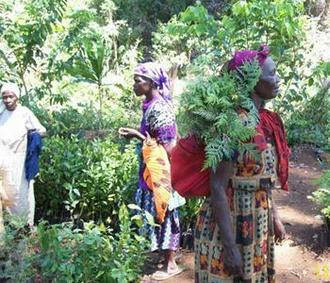Clean Up the World volunteers safeguard biodiversity
 |
|
Member of Save Mount Kenya Forest from Extinction carries tree seedlings for planting on the mountain. [Environment News Service] |
The Royal Marine Conservation Society of Jordan joined the Clean Up the World campaign 14 years ago to prevent further damage to the Gulf of Aqaba from underwater garbage and marine debris. Last year, 75 divers collected 1010 kilos of garbage from Aqaba Marine Park and more divers are expected to participate this year.
To protect the endangered forest of Africa's second highest mountain, volunteers from the group Save Mount Kenya Forest From Extinction are planting thousands of seedlings again this year. They aim to improve Kenyan forest cover from two percent to 10 percent over the next 10 years, restoring ecosystems degraded by logging and land mismanagement. The next step is to educate local communities on environmental issues, reforestation and income-generating activities from trees, such as bee keeping.
Ecologia y Reciclaje de Sonora, a recycling and ecology organization in Mexico, constructed a house out of discarded plastic and glass drink bottles for the indigenous community of San Pablo del Monte municipality in Tlaxcala. The community as well as government, business groups, media and schools are partners in the project.
The Scout Association of Guyana is working to preserve a local turtle population by clearing marine debris from beaches.
In India, 100 families are joining forces to plant tree saplings across three different areas of Vasundhara in Ghaziabad.
In northeastern Romania, the Association Iubim Natura is educating the city of Bacau on conservation and recycling through festivals and films.
"The current state of biodiversity and the implications of its continued loss threaten human well-being and economies, North and South," said UNEP Executive Director Achim Steiner.
"By acting locally, we can work towards reducing the impacts of land-based pollution and unsustainable consumption patterns, two of the factors underlying environmental degradation and the loss of natural capital," Steiner said. "It is our responsibility, as custodians of the planet today, to conserve and to promote sustainable use and to hand over a healthy, functioning and productive natural world to the next generation."
 0
0 






